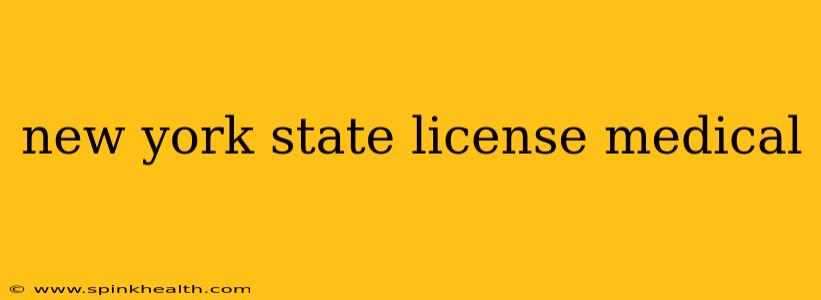The journey to becoming a licensed medical professional in New York State is a challenging yet rewarding one, filled with rigorous requirements and a commitment to excellence. This isn't just about passing exams; it's about demonstrating a dedication to patient care and upholding the highest ethical standards. Let's explore the path, addressing common questions along the way.
What are the requirements to obtain a medical license in New York State?
Securing a medical license in New York is a multi-step process. It starts long before graduation, with the demanding curriculum of medical school. After completing medical school, you'll need to excel on the United States Medical Licensing Examination (USMLE) Steps 1, 2 CK, and 3. Think of these exams as major milestones, each demanding months of focused preparation. Passing these is crucial for even applying for a license.
Beyond the USMLE, New York requires completion of a residency program accredited by the Accreditation Council for Graduate Medical Education (ACGME). This hands-on training is where future doctors gain practical experience under the guidance of experienced professionals. The type of residency will depend on the chosen medical specialty. Finally, you’ll need to pass a state-specific jurisprudence exam, proving your understanding of New York's medical laws and regulations. This isn't a mere formality; it ensures you're prepared to practice ethically and legally within the state. The entire process is meticulously documented and requires careful attention to detail.
How long does it take to get a medical license in New York?
The timeframe for obtaining a New York medical license is significantly influenced by the individual's academic path and chosen specialty. The process isn't a sprint, but more of a marathon. From starting medical school to finally receiving your license, expect a commitment of at least 10 years. This includes the four years of medical school, followed by a three- to seven-year residency, depending on the chosen specialty. Adding in the time required for USMLE preparation and the application process itself, reaching this goal requires considerable dedication and perseverance.
What is the cost of obtaining a medical license in New York?
The financial burden of becoming a licensed physician in New York is substantial. Medical school tuition alone can run into hundreds of thousands of dollars. Factor in the expenses associated with USMLE preparation materials, application fees, and residency living costs, and the overall cost becomes significantly higher. While financial aid and scholarships exist, thorough planning and resourcefulness are vital to navigating this financial landscape. It’s an investment in your future, but one that requires careful budgeting and consideration.
What are the continuing medical education (CME) requirements for maintaining a medical license in New York?
Maintaining a medical license in New York requires ongoing professional development. Physicians must participate in continuing medical education (CME) activities to stay abreast of the latest advancements in their field and maintain their competence. The specific requirements vary, but generally involve a set number of CME credits earned within a specific timeframe. These credits can be obtained through various methods, including attending conferences, completing online courses, and participating in workshops. It’s a commitment to lifelong learning and ensures physicians remain proficient in providing the best possible patient care.
How do I renew my medical license in New York?
Renewing your medical license in New York is a periodic process, typically occurring every few years. The specifics, including the renewal period and required documentation, are clearly outlined by the New York State Education Department (NYSED), the governing body responsible for licensing. These requirements include the verification of continued CME participation and payment of renewal fees. Failure to renew on time can lead to suspension or revocation of the license, highlighting the importance of staying organized and adhering to the renewal schedule.
This journey to licensure in New York is rigorous, but the rewards – the opportunity to serve patients, advance medical knowledge, and contribute to the health and well-being of the community – make it a profoundly fulfilling pursuit. The meticulous process reflects the high standards that New York sets for its medical professionals.

